Over the last several weeks, shelter residents and volunteers said they’ve seen increased enforcement around cooking and vending at the site, including an operation on Oct. 17 in which the Parks Department and NYPD confiscated canopy tents and other equipment.
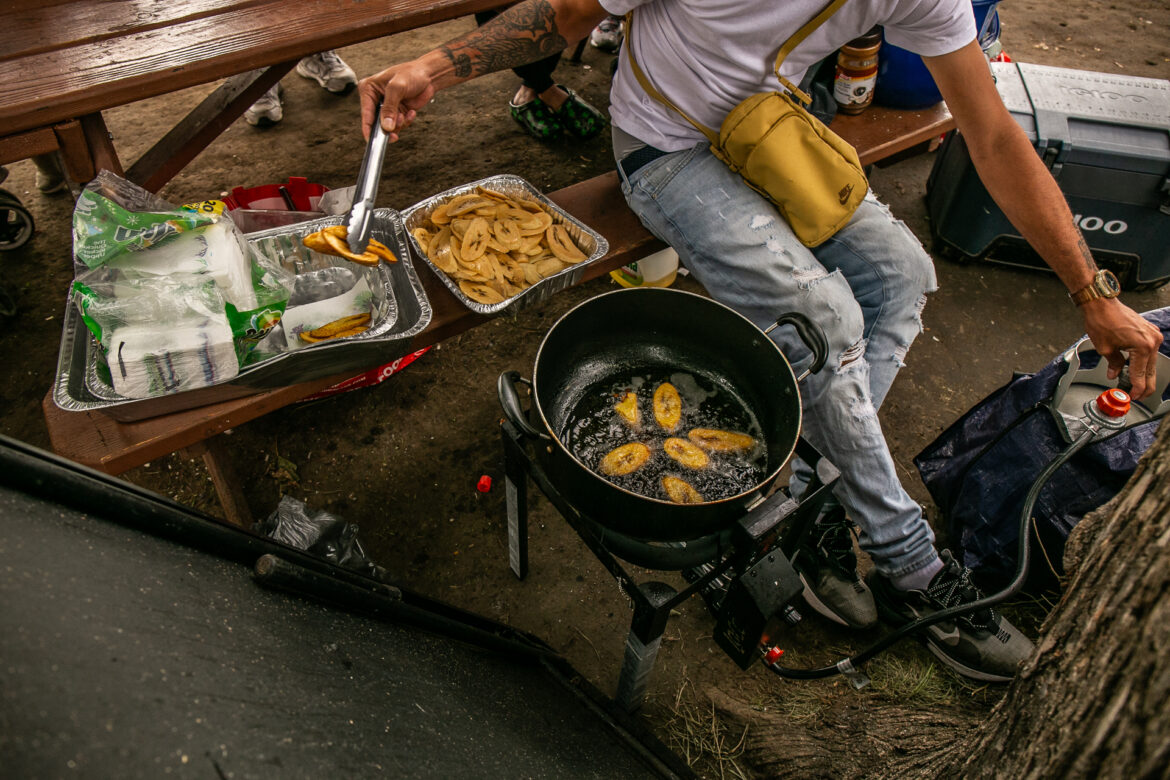
Adi Talwar
A man uses a camping stove, borrowed from another shelter resident, to fry plantains.Lea la versión en español aquí.
Since August, the city has been using the 2,000-person shelter tent complex on Randall’s Island to accommodate single immigrants and immigrant couples, housed in one of the city’s largest Humanitarian Emergency Response and Relief Centers (HERRCs), built over part of the park’s soccer fields.
The facility is fragmented into separate sections with five tall white tents. Showers, bathrooms, and a food distribution area are outside the sleeping tents, where cots are just inches from one another.
City officials say more than 140,000 immigrants have arrived in the city over the last year and a half, approximately 65,000 of whom remain in the shelter system. Facing limited options for work and city-imposed shelter deadlines, some have turned to street vending.
In mid-October, when City Limits visited the Randall’s Island facility, a number of vendors were operating around the shelter tents, selling their wares. Four open-air barbers were cutting hair, while others had spread colorful blankets on the grass, peddling clothes and other merchandise. Small groups of people with mopeds offered rides to the nearest subway station for a few dollars; others cooked and prepared meals and snacks to sell. Along the length of the interlocking steel barricade, supermarket carts were parked, full of bagged plastic bottles.
Over the last several weeks, shelter residents and volunteers said they’ve seen increased enforcement around cooking and selling at the site, including an operation on Oct. 17 in which the Parks Department and NYPD confiscated canopy tents and other cooking equipment, as well as scooters and shopping carts used by many to collect used bottles for recycling money.
City staffers returned on Nov. 14 to stop people from cooking near trees—which is prohibited under park rules—and to return picnic tables that had been moved.
NYC Parks Spokesperson Gregg McQueen said that the agencies continue “to enforce existing rules at all NYC parks, including those against unpermitted vending and unlawful fires.” No summonses were issued, he added, and flyers about park rules were distributed.
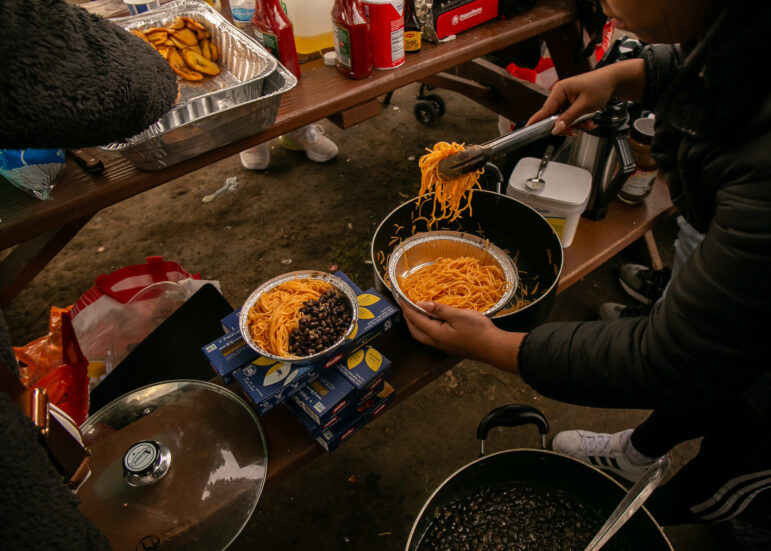
Adi Talwar
A shelter resident prepares meals to sell outside the Randall’s Island HERRC on Oct. 18.The agency said that while anyone is free to use the park’s grills within the 12 designated picnic areas, any type of open flame or on-the-ground campfire is prohibited.
“The fellas tried to make rice but they wouldn’t let us give it away,” Ramon Villazana, 28, told City Limits in Spanish via text message last Wednesday. “They made us bring it down uncooked.”
Villazana, a Venezuelan immigrant who arrived in the city more than a year ago and is staying with his family in another emergency shelter, had for the last few weeks, along with two other immigrants, been providing free hot meals to those at Randall’s Island, using donations they received. While the HERRC facility serves three meals a day, including a hot dinner at night, some residents complained about the quality of the food, and the portions.
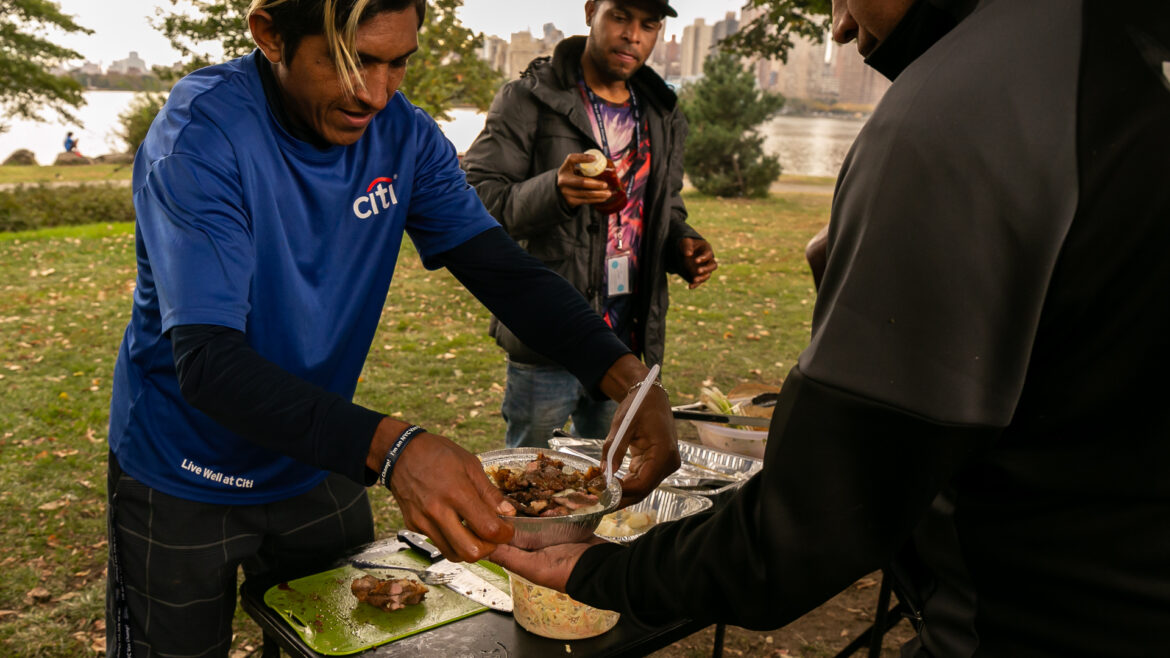
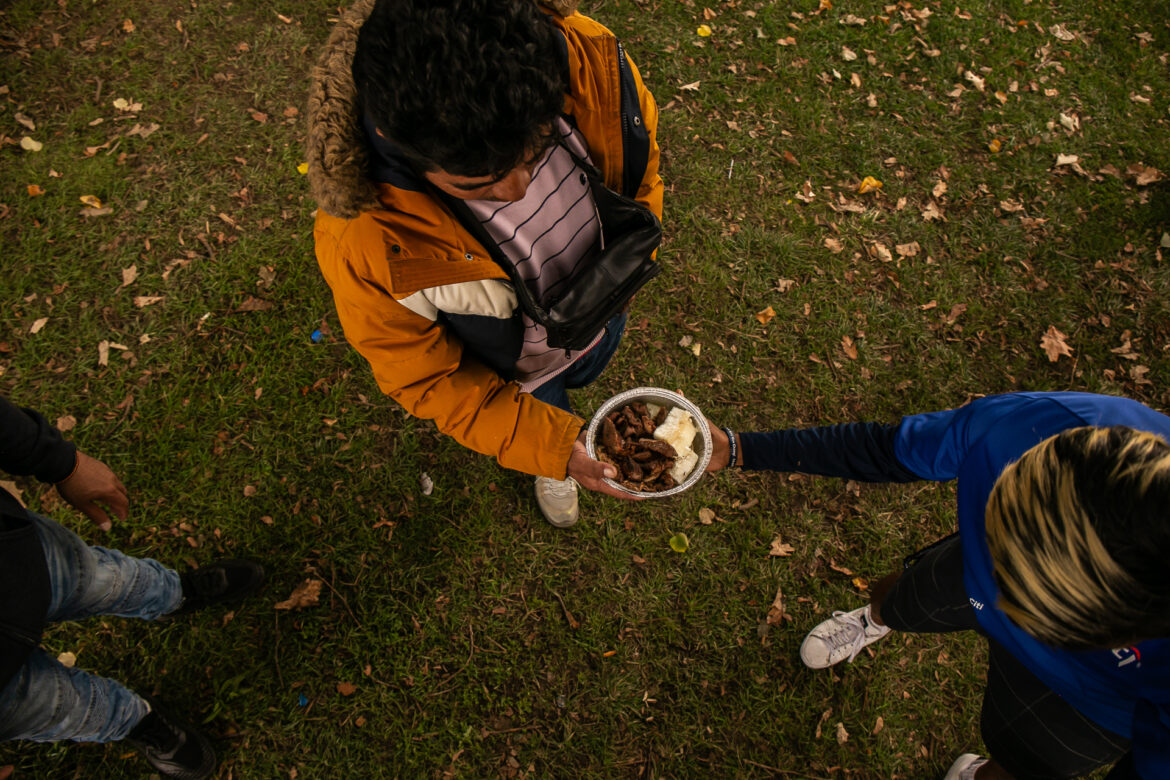
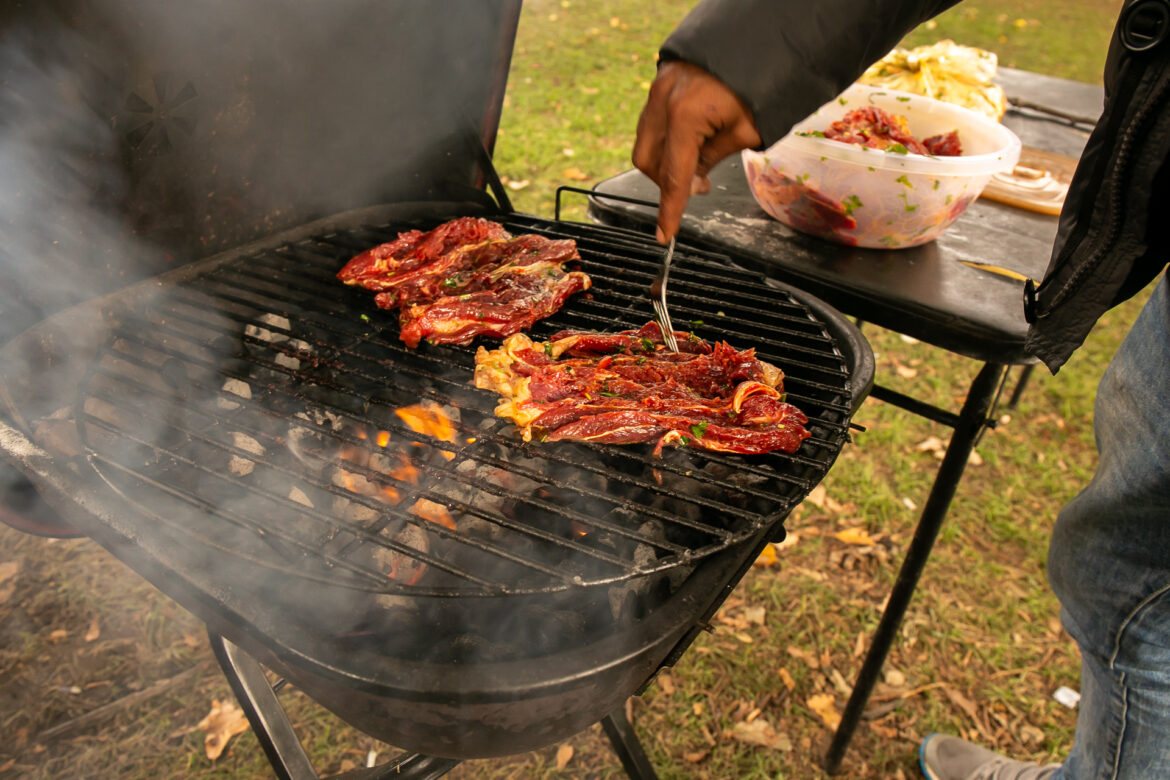
Above: volunteers preparing meals for shelter residents on Randall’s Island on Oct. 18. Photos by Adi Talwar.
When City Limits visited the park-turned-shelter site in late October, Villazana was preparing to serve about 25 lunches of grilled meat or roast chicken on a bed of salad and boiled yucca. His goal, he said, was “to help—just as people helped us when we came to this country.”
For others, cooking presented an economic opportunity in the face of pending shelter deadlines. Some, like José, 28, felt that the island’s isolation in the East River made it an ideal place for small vendors to spring up.
“This was my dream when I left Ecuador, to cook in New York,” José—who asked that his full name not be used for fear of retaliation—said in Spanish. His goal is to sell his food along Roosevelt Avenue in Queens, a popular area for vendors.
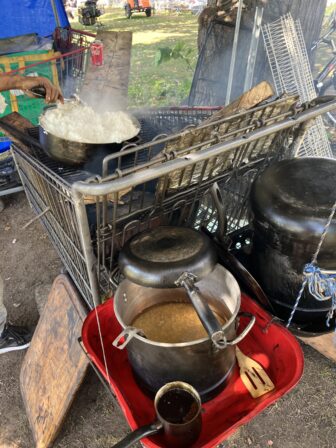
Daniel Parra
José, cooking rice and lentils.José, who was cooking rice with lentils and grilled meat that day, had adapted items he’d sourced to make a barbecue with wheels for outdoor cooking: on a supermarket shopping cart he’d placed half of a metal barrel, and therein stacked wood and a grill. People had been passing by since noon asking for the menu of the day, and by 1 p.m., several guests were sitting around his canopy tent, asking when lunch would be ready.
“Of all the people you see,” José said, pointing to the eight other canopy tents that October afternoon selling some type of Latin American food, “I’m the only one who cooks with wood, and you know that gives a unique taste.”
The small food stand not only helped him provide for his family and children in Ecuador, he explained, but allowed him to offer a few dollars and a plate of food to compensate others who helped him with the operation—sourcing wood for the cooking fire, cleaning cooking tools and utensils, driving him to and from the supermarket in Harlem for ingredients. “It’s better to live among immigrants, there are no complaints,” José said.
When city agencies broke up the market on Oct. 17, José was waiting at the Roosevelt Hotel—the city’s main intake center for immigrants—to reapply for placement in the shelter system, part of a city policy that limits most migrants’ shelter stays to 30 or 60 days. José’s 60-day limit had expired.
That Tuesday afternoon, he received a video call from a colleague telling him that his three grocery carts had been confiscated. “Everything was there,” José said, including his bicycle, his clothing, as well as the supplies he’d accumulated for cooking and vending: sauces, condiments, knives, pots, cutting boards, cardboard plates, plastic utensils, and napkins.
“Why?” he asked a reporter via text message. “We were far from the city, we didn’t bother anyone there.”
A day after the October operation, only three immigrants had timidly ventured out to cook in the area of the island’s tent complex, based on City Limits’ observation. Though few in number, their pots attracted waves of diners who sat down to eat at the park’s picnic tables, while others ate standing up and some ordered take-out. There was only one barbershop in operation.
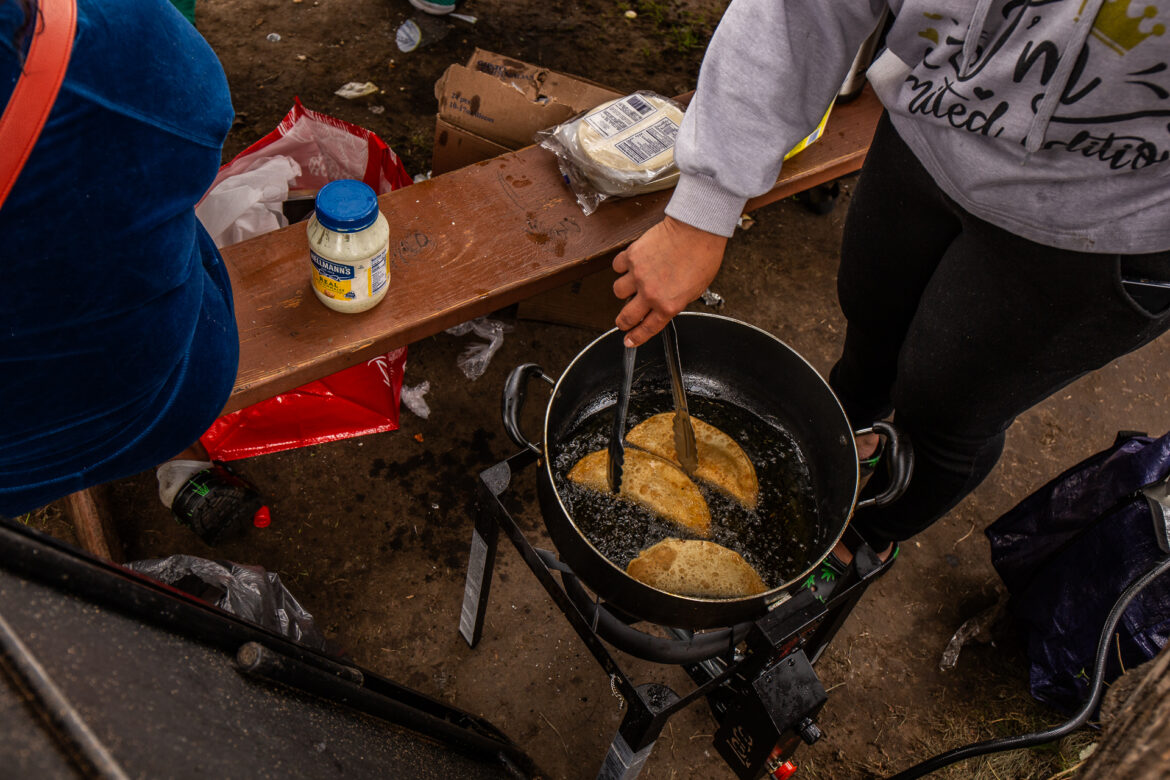
Adi Talwar
Yoselín preparing Venezuelan-style pastelitos, which she was selling for $2 each.At one of the tables, Yoselín and Cármen, two shelter residents, were preparing Venezuelan-style pastelitos, assembling them according to people’s requests—cheese; cheese and ham; or potato and meat—before frying them for $2 a piece.
Three weeks earlier, Yoselín, who asked that her full name not be used for fear of retaliation, had borrowed $40 from another immigrant she knew at the shelter. “With that, I bought a thermos flask, coffee, sugar, water, and plastic cups,” said Yoselín, 34, adding that she started out selling coffee for $1.
In just a few days, selling from 7 a.m. to 11 p.m., she’d paid off the initial loan and had enough to expand. She bought a propane tank and a square, single-burner outdoor stove to fry the pastelitos, while Cármen, whom she had befriended at the HERRC, took orders and put the filling in the empanada skins.
On the day of the October crackdown, as soon as they saw the cops, the pair had packed up everything and left. “The tent was taken away,” Yoselín said.
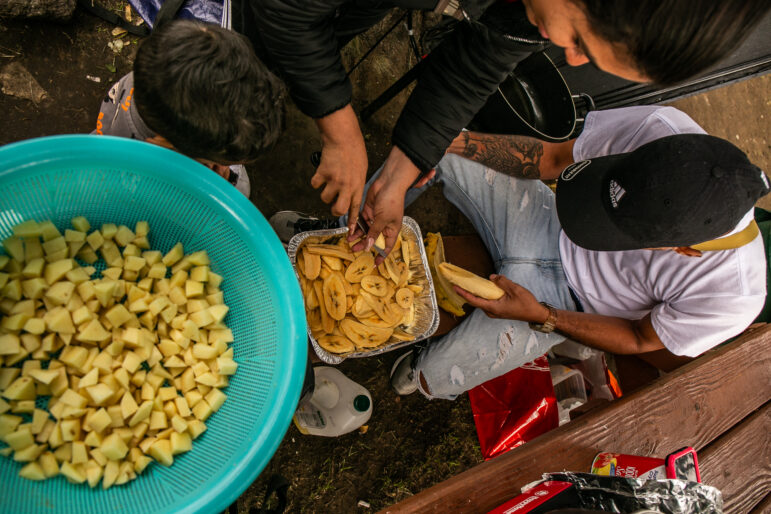
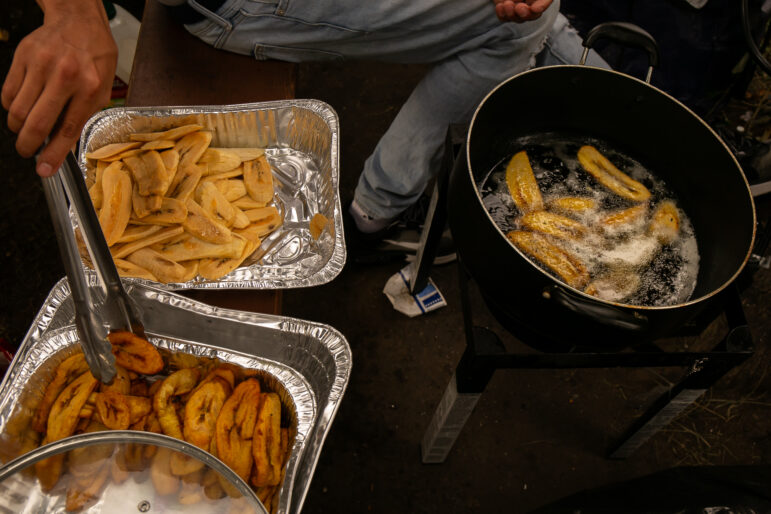
Above: People preparing meals to eat and sell on Randall’s Island on Oct. 18. Photos by Adi Talwar.
Yoselín continued to sell until Oct. 22, when she and her husband’s stay at the Randall’s shelter expired. With the savings they’d earned, they were able to rent a room in Fordham Heights in the Bronx, where they pay $1,450 a month.
But since she stopped vending, the couple’s income has dropped, and she now worries they won’t be able to pay next month’s rent.
Yoselín goes out looking for work and asks her acquaintances, but since leaving Randall’s, she hasn’t found a job. Her husband has found work as an app driver, but the couple worries they will not be able to send funds to their children in Venezuela.
“We reinvented ourselves and were able to lease,” she said, but “there is no more money left.”
To reach the reporter behind this story, contact Daniel@citylimits.flywheelstaging.com. To reach the editor, contact Jeanmarie@citylimits.flywheelstaging.com








